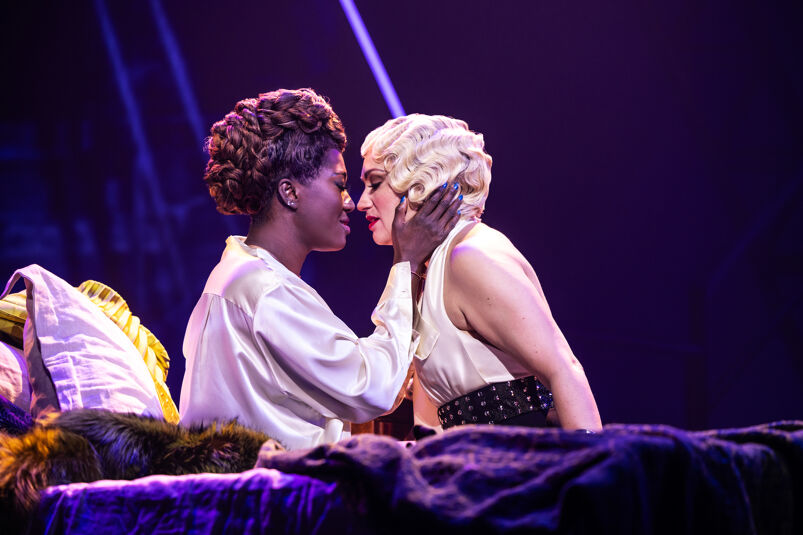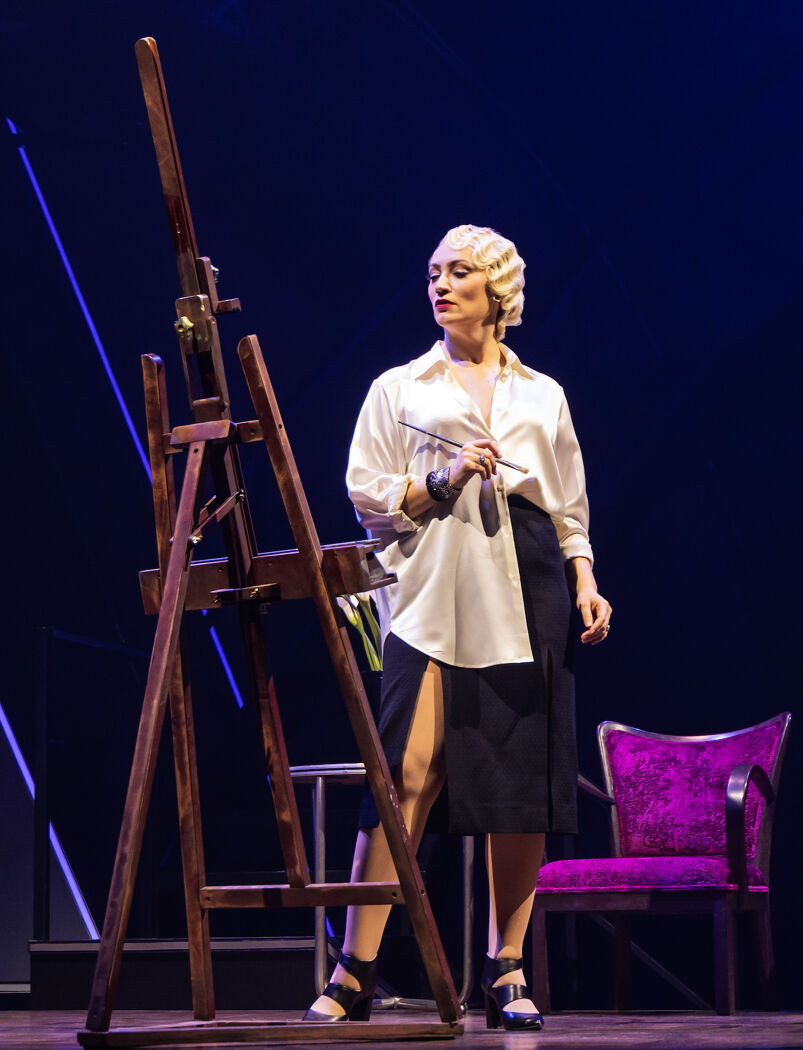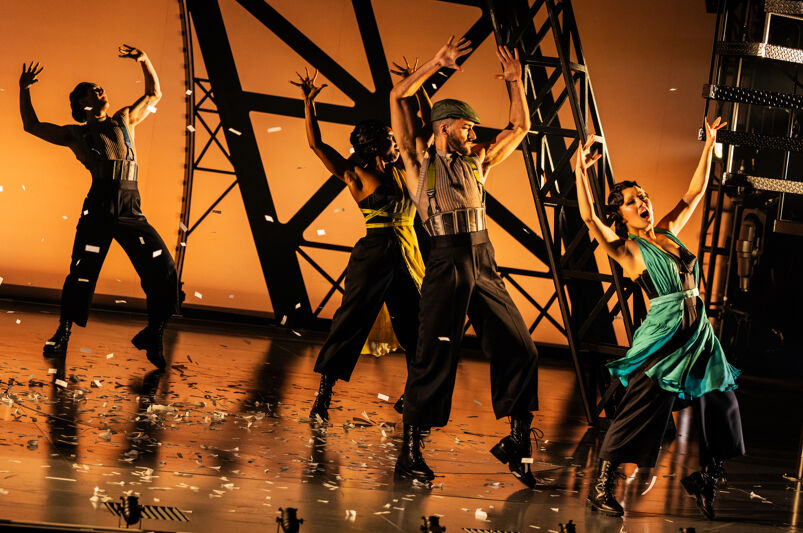
The Rundown
Ever heard of Tamara de Lempicka? Unless you were an art history major, likely not. But queers of a certain age are more familiar with the Polish-born painter than they may think. Madonna has paid homage to the artist in multiple videos, including “Open Your Heart” and “Express Yourself,” as well as visually referencing her works in live shows, including The Celebration Tour.
Beyond the canvas, Lempicka’s progressive lifestyle also ruffled feathers in society. She married Tadeusz Lempicki at age 16 and, shortly after, used her charm and wit to save him from the Bolsheviks during the Russian Revolution. When they settled in Paris, Lempicka took on several female lovers.
Carson Kreitzer (book, lyrics, and original concept) and Matt Gould (book and music) bring Lempicka’s story to life (sort of) in a new Broadway musical directed by Rachel Chavkin (Hadestown).
Related:
Get into the groove: 25 fascinating facts about Madonna’s Celebration Tour
As the biggest-selling female recording artist of all time, Madonna more than earned a victory lap.
How about we take this to the next level?
Subscribe to our newsletter for a refreshing cocktail (or mocktail) of LGBTQ+ entertainment and pop culture, served up with a side of eye-candy.
No Tea, No Shade
“Why were they voguing?” my companion asks at intermission, referring to a dance sequence early in the show. “Ah, that makes sense,” she responds with a slightly perplexed look after I explain the Madonna connection. Herein lies Lempicka’s challenge: the musical wants to capitalize on Madonna and other pop stars’ notoriety along with sense of agency uncommon to female artists of the era, but its creators have stretched the canvas so thin that the brush strokes crack.
As the title character, Eden Espinosa (Wicked, The Gardens of Anuncia) is tasked with delivering a generation-spanning performance. Besides an occasionally witty lyric — “Oh, you’ve got to go to New York for culture. New York. I’ve got jewelry older than New York.” — her connections remain surface-level, both in regards to her love life and her artistic aesthetic.
Ricardo Herández’s scenic design and Peter Nigrini’s projection design merely tease Lempicka’s evolving painting style during her 20-year tenure in Paris. Her affairs, distilled to a composite female character named Raphaela (a captivating Amber Iman), consume much of the plot, while her husband (Andrew Samonsky) and M3gan lookalike daughter (Zoe Glick) pop in and out to remind us that she’s a rule-breaker.

While Lempicka’s bisexuality is common knowledge, its execution conflates her deeper struggle and desire for polyamory. In the musical’s opening moments, she asks, “Have you ever loved someone more than life itself? I had the great good fortune to love not once but twice. In this life. And I had the great misfortune to love them both at the same time.”
In another Madonna reference, costume designer Paloma Young outfits the ensemble in corsets and plainly draped fabrics that read like a RuPaul’s Drag Race design challenge gone wrong. Further troubling, Raja Feather Kelly’s (A Strange Loop) choreography rarely contextualizes or amplifies Lampicka’s actions, save one scene at the queer underground nightclub Monocle, run by Suzy Solidor (Natalie Joy Johnson), a character based on the real-life openly lesbian singer, actress, and entrepreneur.
By the musical’s end, both of Lempicka’s relationships unravel, leaving the artist with only one logical choice — hook up with one of her wealthy benefactors and move to LA, which dilutes her real-life final chapters, including a return to Paris and final years in Mexico.

Let’s Have a Moment
After a night at the club, Lempicka invites Rafaela to her artist studio. Lovemaking ensues, after which the artist returns to her canvas. Her husband comes knocking at the door while Rafaela sleeps in the back room, and while Lempicka dodges a three-way confrontation this time around, something arises in her soul that refuses to be tampered down.
Espinosa, familiar with singing to the rafters after star turns in Wicked, Rent, and In the Heights, closes Act I with “Woman Is,” a soaring manifesto of sapphic reclamation. In a Broadway season mostly void of LGBTQ+ visibility, the song and its message break through the show’s construct to portray a woman who refuses to live by anyone else’s rules.
The Last Word
“We really do allow Tamara to be as flawed and complicated as any male protagonist has ever been allowed to be,” director Chavkin said in an interview with NPR. “And women very rarely are, because for so many reasons, we’re worried about ‘Is the woman likable?’ And so, you end up flattening out character after character, when, of course, what makes for good drama often is a thorniness.”
In that regard, Lempicka succeeds. She is not a heroine or a savior. Nor is she a traditional matriarch or always likable.
“‘There are no miracles,” Tamara de Lempicka once said. “There is only what we make.” In a season of 17 new Broadway musicals and a crowded race to the Tony Awards, her words ring true. Audiences will decide if Lempicka is back in fashion. But I have a feeling if she were around, she’d be marching to the beat of her own drum, regardless.
Lempicka plays at the Longacre Theatre in New York City. Open-ended run.


















